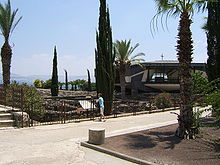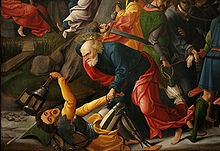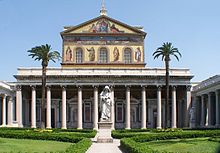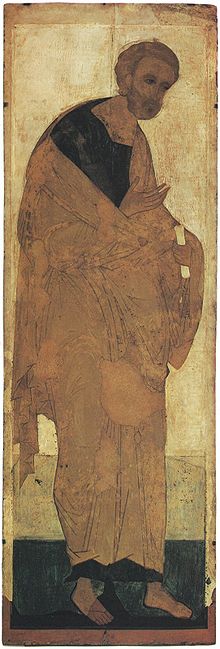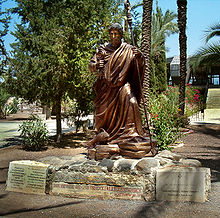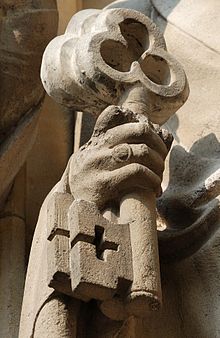- Saint Peter
-
For other uses, see St. Peter (disambiguation).
Saint Peter the Apostle 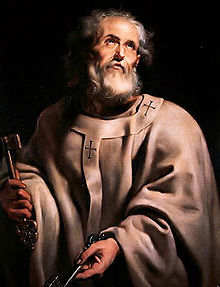
Painting of Saint Peter by Peter Paul Rubens depicting the saint as Pope (1611-1612).Prince of the Apostles, First Pope, Martyr, Preacher Born ca. 1 BC
BethsaidaDied possibly AD 67
Rome, by crucifixionHonored in Catholic Church, Eastern Orthodox Church, Anglican Communion, Lutheranism, Oriental Orthodoxy, Islam (honoured)[1] Major shrine St. Peter's Basilica Feast main feast (with Paul of Tarsus) 29 June (Catholic Church, Eastern Orthodox Church, Oriental Orthodoxy, Anglicanism, Lutheranism)
Chair of St Peter in Rome 18 January (Pre-1960 Roman Calendar)
Confession of St Peter 18 January (Anglicanism)
Chair of St Peter 22 February (Roman Catholic Church)
St Peter in Chains 1 August (pre-1960 Roman Calendar)Attributes Keys of Heaven, pallium, Papal vestments, Rooster, man crucified head downwards, vested as an Apostle, holding a book or scroll. Iconographically, he is depicted with a bushy white beard and white hair Patronage See St. Peter's Patronage Influences Jesus Major work(s) 1 Peter
2 Peter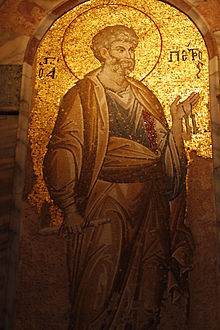 Saint Peter medieval mosaic from Chora Church
Saint Peter medieval mosaic from Chora Church
Saint Peter or Simon Peter was an early Christian leader, who is featured prominently in the New Testament Gospels and the Acts of the Apostles. The son of John or of Jonah and from the village of Bethsaida in the province of Galilee, his brother Andrew was also an apostle. Simon Peter is venerated in multiple churches and is regarded as the first Pope by the Roman Catholic Church. After working to establish the church of Antioch for seven years presiding as the city's bishop[2] and preaching to scattered communities of believers (Jews, Hebrew Christians and the gentiles), in Pontus, Galatia, Cappadocia, Asia Minor and Bithynia, Peter went to Rome. In the second year of Claudius, it is claimed, he overthrew Simon Magus and held the Sacerdotal Chair for 25 years. He is said to have been put to death at the hand of Nero. He wrote two Catholic epistles. The Gospel of Mark is also ascribed to him (as Mark was his disciple and interpreter). On the other hand, several books bearing his name—the Acts of Peter, Gospel of Peter, Preaching of Peter, Revelation of Peter, and Judgement of Peter—are rejected by Christians as Apocryphal.[3][4][5]
According to New Testament accounts, he was one of Twelve Apostles, chosen by Jesus from his first disciples. He was a fisherman assigned a leadership role by Jesus and was with Jesus during events witnessed by only a few Apostles, such as the Transfiguration.[6] Upon his death, he is said to have been martyred by Emperor Nero and crucified upside down on an inverted cross, as he saw himself unworthy to be crucified the same way like Jesus Christ.
Names and etymologies
Peter, a name derived from the Greek word for rock, is also known as Simon Peter, Cephas (Greek: Κηφᾶς) and Kepha (Hebrew: כיפא). Both Cephas and Kepha also mean rock. His original name was Shimon or Simeon. Simon Peter (Greek: Πέτρος Pétros, "stone, rock";[7] possibly died AD 67), sometimes Simon Cephas (Greek: Σιμων Κηφᾶς Simōn Kēphas; Aramaic: Šimʻōn Kêfâ; Syriac: ܫܶܡܥܽܘܢ ܟ݁ܺܐܦ݂ܳܐ Sëmʻān Kêfâ) after his name in Hellenised Aramaic. Cepha (cephah) is a native Aramaic Syriac word (Syriac: ܟ݁ܺܐܦ݂ܳܐ Kîpâ).[8] However, a "loose language" modern Aramaic (Hebrew, Chaldee, Arabic, &c.,) dictionary may define Cepha, e.g., such as in Hebrew: כֵּיפׇא \ כֵּיף, to mean Rock, yet, may not explain the actual origin of the word itself.[9] It is unlikely that one will find this particular word ܟ݁ܺܐܦ݂ܳܐ in any "strict language" Aramaic dictionary other than that of the Aramaic Syriac dictionary. For instance the Hebrew word for Cepha (כֵּיפׇא) would not be present, while סֶלַֽע (ßĕ'lặᵉ) ; i.e., rock, cliff, Petra][10] would, for סֶלַֽע is a native Hebrew word.[10] Within a "strict language" dictionary the word will be in its native and original form, thus rock will be translated into the language that which is being used, e.g., "English-Hebrew dictionary"[11] where the word(s) for rock is translated as such : (הִתְנַדְנֵד−.פ, הִתְנוֹעֵעַ, הׇנֵעַ, נַדְנֵד, סֶלַע, צוּר, ש. (ריִֹק and not כֵּיפׇא \ כֵּיף.
The (Hebrew: כֵּיפׇא \ כֵּיף) is an indirect transliteration of the Syriac (ܟ݁ܺܐܦ݂ܳܐ), however the (Greek: Κηφᾶς) is a direct transliteration of the Syriac (ܟ݁ܺܐܦ݂ܳܐ) and the (Hebrew: כֵּיפׇא \ כֵּיף) a direct transliteration of the Greek. Though the Hebrew word (Hebrew: כאפא) is also used to which is a direct transliteration of the Syriac. (cƒ. Interlinear Peshitta Aramaic New Testament Bible Matthew xvi. 18)
Kephas, Hebrew for "rock," was translated into Greek as Petros (which means "stone"), and into Latin as Petrus, from which are derived the English and German "Peter", the French "Pierre", the Italian "Pietro", the Spanish and Portuguese "Pedro", and the Russian "Piotr."
New Testament account
Ruins of ancient Capernaum on north side of the Sea of Galilee. An Orthodox church is built on top of traditional site of Apostle Peter's house.
Peter's life story relies on the four Canonical Gospels, The Book of Acts, New Testament Letters, Non-Canonical Gospels such as the Gospel According to the Hebrews and other Early Church accounts of his life and death. In the New Testament, he is among the first of the disciples called during Jesus' ministry. It was during his first meeting with Jesus that Jesus named him Peter. Peter was to become the first Apostle ordained by Jesus in the early church.[6]
Peter ran a fishing business in Bethsaida.[Jn. 1:44] He was named Simon, son of Jonah or John.[12] The synoptic gospels all recount how Peter's mother-in-law was healed by Jesus at their home in Capernaum[Matt. 8:14–17] [Mk. 1:29–31] [Lk. 4:38] which, coupled with 1Cor 9:5, clearly depict Peter as married or a widower.
In the Synoptic Gospels, Peter (then Simon) was a fisherman along with his brother Andrew and the sons of Zebedee, James and John. The Gospel of John also depicts Peter fishing, even after the resurrection of Jesus, in the story of the Catch of 153 fish.
In Matthew and Mark, Jesus called Simon and his brother Andrew to be "fishers of men."[Matt. 4:18–19] [Mk. 1:16–17]
Part of a series on Saint Peter 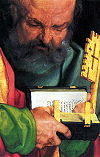
In the New Testament Confession · Denial · Vision · Liberation
Epistles: 1 Peter · 2 PeterOther Primacy · Cross · Tomb · In Islam v · Luke, Simon Peter owns the boat that Jesus uses to preach to the multitudes who were pressing on him at the shore of Lake Gennesaret.[Lk. 5:3] Jesus then amazes Simon and his companions James and John (Andrew is not mentioned) by telling them to lower their nets, whereupon they catch a huge number of fish. Immediately after this, they follow him.[Lk. 5:4–11] The Gospel of John gives a comparable account of "The First Disciples."[Jn. 1:35–42] In John, we are told that it was two disciples of John the Baptist (Andrew and an unnamed disciple) who heard John the Baptist announce Jesus as the "Lamb of God" and then followed Jesus. Andrew then went and fetched his brother Simon, saying, "We have found the Messiah," and then brought Simon to Jesus.
The "Rock" dialogue
In a dialogue between Jesus and his disciples (Matthew 16:13-20), Jesus asks, “Who do people say that the Son of Man is?” The disciples give various answers. When he asks, "Who do you say that I am?" Simon Peter answers, "You are the Christ, the Son of the living God." In turn, Jesus declares Peter to be "blessed" for having recognized Jesus' true identity and attributes this recognition to a divine revelation. Then Jesus addresses Simon by what seems to have been the nickname "Peter" (Cephas in Aramaic, Petros [rock] in Greek) and says, "On this rock I will build my church, and the gates of Hell will not prevail against it."
A common exegetical interpretation of Peter is provided by Daniel Harrington who suggests that Peter was an unlikely symbol of stability. While he was one of the first disciples called and served as the spokesman for the group, Peter is also the exemplar of "little faith" in Matthew 14, will soon have Jesus say to him, "Get behind me, Satan," and will eventually deny Jesus three times. In light of the Easter event, then, Peter became an exemplar of the forgiven sinner.[13] A great variance of opinions exists as to the interpretation of this passage with respect to what authority and responsibility, if any, Jesus was giving to Peter.
Petros had not previously been used as a name, but in the Greek-speaking world it became a popular Christian name, after the tradition of Peter's prominence in the early Christian church had been established.
In the Eastern Orthodox Church this passage is interpreted as not implying a special prominence to the person of Peter, but to Peter's position as representative of the Apostles. The word used for "rock" (petra) grammatically refers to "a small detachment of the massive ledge",[14] not to a massive boulder. Thus, Orthodox Sacred Tradition understands Jesus' words as referring to the Apostolic Faith.
The great majority of Western scholars concur with the interpretation that the "rock" was Peter, not Jesus himself or Peter's faith.[15]
Position among the apostles
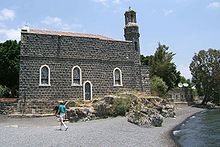 Church of the Primacy of St. Peter on the Sea of Galilee. Traditional site where Jesus Christ appeared to his disciples after his resurrection and, according to Catholic tradition, established Peter's supreme jurisdiction over the Christian church.
Church of the Primacy of St. Peter on the Sea of Galilee. Traditional site where Jesus Christ appeared to his disciples after his resurrection and, according to Catholic tradition, established Peter's supreme jurisdiction over the Christian church.
Peter is always mentioned first in the lists of the Twelve Apostles given in the canonical gospels[16] and in the Book of Acts (Acts 1:13). He is also frequently mentioned in the Gospels as forming with James the Elder and John a special group within the Twelve Apostles, present at incidents at which the others were not present, such as at the Transfiguration of Jesus. He often confesses his faith in Jesus as the Messiah.
Peter is often depicted in the Gospels as spokesman of all the Apostles. Catholics refer to him as chief of the Apostles,[17] as do the Eastern Orthodox[18] and the Oriental Orthodox.[19][20] In Coptic Orthodox Church Liturgy, he is once referred to as “Prominent” or "head" among the Apostles, a title shared with St. Paul in the text (The Fraction of Fast and Feast of the Apostles Peter and Paul in the Coptic Orthodox Church of Alexandria). Some, including the Orthodox Churches, believe this is not the same as saying that the other Apostles were under Peter's orders. In contrast, Jewish Christians are said to have argued that James the Just was the leader of the group.[21] Some argue James was the Patriarch of Jerusalem and that this position at times gave him privilege in some (but not all) situations. The early Church historian Eusebius (c. AD 325) records Clement of Alexandria (c. AD 190) as saying,
"For they say that Peter and James and John after the ascension of our Saviour, as if also preferred by our Lord, strove not after honor, but chose James the Just bishop of Jerusalem."[22]
Paul affirms that Peter had the special charge of being apostle to the Jews, just as he, Paul, was apostle to the Gentiles.
Walking on water
Three of the four canonical Gospels—Matthew, Mark and John—recount the story of Jesus walking on water. Matthew additionally describes Peter walking on water for a moment, but began to sink when his faith wavered.[Matt. 14:28–31]
Washing of feet
At the beginning of the Last Supper, Jesus washed his disciples' feet. Peter initially refused to let Jesus wash his feet, but when Jesus responded: "If I wash thee not, thou hast no part with me", Peter replied: "Lord, not my feet only, but also my hands and my head".[Jn. 13:2-11] The washing of feet is often repeated in the service of worship on Maundy Thursday by some Christian denominations.
Arrest of Jesus
The three synoptic Gospels all mention that, when Jesus was arrested, one of his companions cut off the ear of a servant of the High Priest.[23] The Gospel of John also includes this event and names Peter as the swordsman and Malchus as the victim.[Jn. 18:10] Luke adds that Jesus touched the ear and miraculously healed it.[Lk. 22:50]
Denial of Jesus by Peter
Main article: Denial of PeterAll four canonical gospels recount that, during the Last Supper, Jesus foretold that Peter would deny him three times before the following cockcrow ("before the cock crows twice" in Mark's account).
The three Synoptics and John describe the three denials as follows:
- A denial when a female servant of the high priest spots Simon Peter, saying that he had been with Jesus. According to Mark (but not in all manuscripts), "the rooster crowed." Only Luke and John mention a fire by which Peter was warming himself among other people: according to Luke, Peter was "sitting"; according to John, he was "standing."
- A denial when Simon Peter had gone out to the gateway, away from the firelight, but the same servant girl (Mark) or another servant girl (Matthew) or a man (Luke and also John, for whom, though, this is the third denial) told the bystanders he was a follower of Jesus. According to John, "the rooster crowed."
- A denial came when Peter's Galilean accent was taken as proof that he was indeed a disciple of Jesus. According to Matthew, Mark and Luke, "the rooster crowed." John, though, does not mention the Galilean accent.
Matthew adds that it was his accent that gave him away as coming from Galilee. Luke deviates slightly from this by stating that, rather than a crowd accusing Simon Peter, it was a third individual.
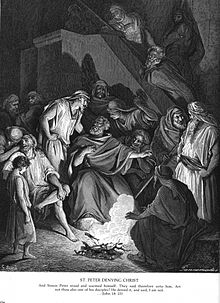 St. Peter Denying Christ, by Gustave Doré
St. Peter Denying Christ, by Gustave Doré
The Gospel of John places the second denial while Peter was still warming himself at the fire, and gives as the occasion of the third denial a claim by someone to have seen him in the garden of Gethsemane when Jesus was arrested.
In the Gospel of Luke, Jesus' prediction of Peter's denial is coupled with a prediction that all the apostles ("you," plural) would be "sifted like wheat," but that it would be Peter's task ("you," singular), when he had turned again, to strengthen his brethren.
In a reminiscent[24] scene in John's epilogue, Peter affirms three times that he loves Jesus.
Empty tomb
In John's gospel, Peter is the first person to enter the empty tomb, although the women and the beloved disciple see it before him.[Jn. 20:1–9] In Luke's account, the women's report of the empty tomb is dismissed by the apostles, and Peter is the only one who goes to check for himself. In fact, he runs to the tomb. After seeing the graveclothes he goes home, apparently without informing the other disciples.[Lk. 24:1–12]
Resurrection appearances

Paul's First Epistle to the Corinthians[25] contains a list of resurrection appearances of Jesus, the first of which is an appearance to Peter.[26] Here Paul apparently follows an early tradition that Peter was the first to see the risen Christ,[6] which however did not seem to have survived to the time when the Gospels were written.[27]
In the final chapter of the Gospel of John, Peter, in one of the resurrection appearances of Jesus, three times affirmed his love for Jesus, balancing his threefold denial, and Jesus reconfirmed Peter's position.[Jn. 21:15–17] Some[who?] scholars hypothesize that it was added later to bolster Peter's status.[28]
Role in the early church
The author of the Acts of the Apostles portrays Peter as an extremely important figure within the early Christian community, with Peter delivering a significant open-air sermon during Pentecost. According to the same book, Peter took the lead in selecting a replacement for Judas Iscariot.[Acts 1:15] He was twice arraigned, with John, before the Sanhedrin and directly defied them.[Acts 4:7–22] [5:18–42] He undertook a missionary journey to Lydda, Joppa and Caesarea,[9:32–10:2] becoming instrumental in the decision to evangelise the Gentiles.[10]
About halfway through, the Acts of the Apostles turns its attention away from Peter and to the activities of Paul, and the Bible is mostly silent on what occurred to Peter afterwards.
John Vidmar writes:
"Both Catholic and Protestant scholars agree that Peter had an authority that superseded that of the other apostles. Peter is their spokesman at several events, he conducts the election of Matthias, his opinion in the debate over converting Gentiles was crucial, etc.[29]
Rescue from prison
Main article: Liberation of Saint PeterActs 12 tells how Peter was put into prison by King Herod, but was rescued by an angel.
Council of Jerusalem
Main article: Council of JerusalemAt the council of Jerusalem (c. 50), the early Church, Paul and the leaders of the Jerusalem church met and decided to embrace Gentile converts. Acts portrays Peter as successfully opposing the Christian Pharisees who insisted on circumcision and the rest of the Mosaic law.[30]
Epistles
Peter/Cephas is mentioned briefly in Paul's Epistle to the Galatians, which mentions a trip by Paul to Jerusalem where he meets Peter (Galatians 1:18), and a trip by Cephas to Antioch[Gal. 2:11-14] where Paul rebuked him for treating Gentile converts as inferior to Jewish Christian (see the Incident at Antioch). Galatians is accepted as authentic by almost all scholars, so these are the earliest mentions of Peter to be written.
Church tradition ascribes the epistles First and Second Peter to Apostle Peter, as does the text of Second Peter itself. First Peter implies the author is in "Babylon," which has been held to be a coded reference to Rome[30] (1 Peter 5:13). Although, Babylon was an important fortress city in Egypt, just north of today's Cairo and this fact is combined with the "greetings from Marc" (1 Peter 5:13), who is regarded as founder of the Church of Alexandria (Egypt); thus other scholars put the First Peter epistle to be written in Egypt. Some[who?] scholars regard First Peter as not authored by him, and there is still considerable debate about the Petrine authorship of Second Peter. However the Greek in both books is similar, and the early Church was adamantly opposed to pseudographical authorship.[30][page needed]
Accounts outside the New Testament
In Catholic tradition, Peter is said to have founded the church in Rome with Paul, served as its bishop, authored two epistles, and then met martyrdom there along with Paul.[6]
Antioch and Corinth
Later accounts expand on the brief Biblical mention of his visit to Antioch. The Liber Pontificalis (9th century) mentions Peter as having served as bishop of Antioch for seven years and having potentially left his family in the Greek city before his journey to Rome.[31] Claims of direct blood lineage from Simon Peter among the old population of Antioch existed in the 1st century and continue to exist today, notably by certain Semaan families of modern-day Syria and Lebanon. Historians have furnished other evidence of Peter's sojourn in Antioch.[32] Subsequent tradition held that Peter had been the first Patriarch of Antioch.
Peter might have visited Corinth, as a party of "Cephas" existed there.[6]
Eusebius of Caesarea (Eusebius Caesariensis, ca 260-ca 340), in his "Historia Ecclesiastica", while naming some of the Seventy Disciples of Jesus, says: "... and the history by Clement (of Alexandria, c.150 - c. 215), in the fifth (chapter) of Hypotyposeis; in which Cefas, the one mentioned by Paul (in the citation): «when Cefas came to Antioch, I confronted him face to face» (Galatians 2:11), it is said he was one of the Seventy Disciples, having the same name with Peter the Apostle".[33]
Death
In the epilogue[30] of the Gospel of John, Jesus hints at the death by which Peter would glorify God,[Jn. 21:18–19]saying "…when you are old you will stretch out your hands, and another will dress you and take you where you do not want to go." This is interpreted by some as a reference to Peter's crucifixion.[24]
According to the 1911 Catholic Encyclopedia, St. Peter labored in Rome during the last portion of his life, and there ended his life by martyrdom.[17] The death of St. Peter is attested to by Tertullian at the end of the 2nd century, and by Origen in Eusebius, Church History III.1. Origen says: "Peter was crucified at Rome with his head downwards, as he himself had desired to suffer."[17] This is why an upside down cross is generally accepted as a symbol of Peter, who would not have considered himself worthy enough to die the same way as his Savior.[34]
Status
St. Clement of Rome identifies Peter and Paul as the outstanding heroes of the faith.[6] Papias reported that the Gospel of Mark was based on Peter's memoirs, a tradition still accepted by some scholars today.[6]
Martyrdom
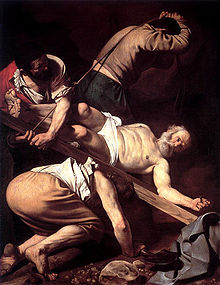 Caravaggio's depiction of the crucifixion of Apostle Peter.
Caravaggio's depiction of the crucifixion of Apostle Peter.
The mention in the New Testament of the death of Peter says that Jesus indicated its form by saying: "You will stretch out your hands, and someone else will dress you and lead you where you do not want to go."[35] Early church tradition (as indicated below) says Peter probably died by crucifixion (with arms outstretched) at the time of the Great Fire of Rome of the year 64. Margherita Guarducci, who led the research leading to the rediscovery of Peter’s tomb in its last stages (1963–1968), concludes Peter died on 13 October AD 64 during the festivities on the occasion of the “dies imperii” of Emperor Nero. This took place three months after the disastrous fire that destroyed Rome for which the emperor wished to blame the Christians. This “dies imperii” (regnal day anniversary) was an important one, exactly ten years after Nero ascended to the throne, and it was ‘as usual’ accompanied by much bloodshed. Traditionally, Roman authorities sentenced him to death by crucifixion. According to the apocryphal Acts of Peter, he was crucified head down. Tradition also locates his burial place where the Basilica of Saint Peter was later built, directly beneath the Basilica's high altar.
Clement of Rome, in his Letter to the Corinthians (Chapter 5), written c. 80–98, speaks of Peter's martyrdom in the following terms: "Let us take the noble examples of our own generation. Through jealousy and envy the greatest and most just pillars of the Church were persecuted, and came even unto death… Peter, through unjust envy, endured not one or two but many labours, and at last, having delivered his testimony, departed unto the place of glory due to him."
The apocryphal Acts of Peter is also thought to be the source for the tradition about the famous phrase "Quo vadis, Domine?" (or "Pou Hupageis, Kurie?" which means, "Whither goest Thou, Master?"). According to the story, Peter, fleeing Rome to avoid execution, asked the question of a vision of Jesus, to which Jesus allegedly responded that he was "going to Rome to be crucified again." On hearing this, Peter decided to return to the city to accept martyrdom. This story is commemorated in an Annibale Carracci painting. The Church of Quo Vadis, near the Catacombs of Saint Callistus, contains a stone in which Jesus' footprints from this event are supposedly preserved, though this was apparently an ex-voto from a pilgrim, and indeed a copy of the original, housed in the Basilica of St Sebastian.
The ancient historian Josephus describes how Roman soldiers would amuse themselves by crucifying criminals in different positions, and it is likely that this would have been known to the author of the Acts of Peter. The position attributed to Peter's crucifixion is thus plausible, either as having happened historically or as being an invention by the author of the Acts of Peter. Death, after crucifixion head down, is unlikely to be caused by suffocation, the usual cause of death in ordinary crucifixion[citation needed].
A medieval tradition[citation needed] was that the Mamertine Prison in Rome is the place where Peter was imprisoned before his execution.
In 1950, human bones were found buried underneath the altar of St. Peter's Basilica. The bones have been claimed by many to have been those of Peter.[36] An attempt to contradict these claims was made in 1953 by the excavation of what some believe to be St Peter's tomb in Jerusalem.[37] However along with supposed tomb of Peter bearing his previous name Simon, tombs bearing the names of Jesus, Mary, James, John, and the rest of the apostles were also found at the same excavation—though all these names were very common among Jews at the time.
In the 1960s, some previously discarded debris from the excavations beneath St Peters Basilica were re-examined, and the bones of a male person were identified. A forensic examination found them to be a male of about 61 years of age from the 1st century. This caused Pope Paul VI in 1968 to announce them most likely to be the relics of Apostle Peter.[38]
Further doubt on finding bones in Rome is cast by Pope Vitalian's letter to King Oswy of the Britons (CE 665), offering him the remains (then called relics) of the apostle Peter and Paul, along with those of the Holy Martyrs Laurentius, John, Gregory and Pancratius as a reward for the emergence of British faith.[39]
Connection to Rome
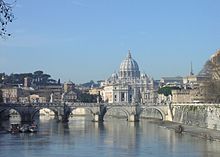 St. Peter's Basilica, believed to be the burial site of St. Peter, seen from the River Tiber. The iconic dome dominates the skyline of Rome.
St. Peter's Basilica, believed to be the burial site of St. Peter, seen from the River Tiber. The iconic dome dominates the skyline of Rome. Basilica of Saint Paul Outside the Walls, believed to be the burial site of St. Paul.
Basilica of Saint Paul Outside the Walls, believed to be the burial site of St. Paul. See also: First phase of papal supremacy
See also: First phase of papal supremacyThe See of Rome is traditionally said to be founded by Peter and Paul, see also Primacy of Simon Peter, who had invested it with apostolic authority. The New Testament says nothing directly about Peter's connection to Rome, but an early Catholic tradition supports such a connection.[6]
That Peter was bishop of Rome is corroborated by both positive and negative evidence.[40] However, some historians have challenged this traditional view of Peter's role in the early Roman Church.[41][42][43][44][45] Still, most Catholic and Protestant scholars,[46] and many scholars in general,[47] conclude that Peter was indeed martyred in Rome under Nero. In 2009 Otto Zwierlein (de) concluded in a critical study that "there is not a single piece of reliable literary evidence (and no archaeological evidence either) that Peter ever was in Rome."[48][49]
1 Clement, a document that has been dated from the 90s to the 120s, is one of the earliest sources adduced in support of Peter's stay in Rome, but questions have been raised about the text's authenticity and whether it has any knowledge about Peter's life beyond what is contained in the New Testament Acts.[48] The Letter to the Romans attributed to St. Ignatius of Antioch implies that Peter and Paul had special authority over the Roman church,[6] telling the Roman Christians: "I do not command you, as Peter and Paul did" (ch. 4). However, the authenticity of this document and its traditional dating to c. 105–10 have also been questioned, and it may date from the final decades of the 2nd century.[48]
Later in the 2nd century, Irenaeus of Lyons believed that Peter and Paul had been the founders of the Church in Rome and had appointed Linus as succeeding bishop.[50] In Against Heresies (Book III, Chapter III, paragraphs 2–3), Irenaeus wrote:
Since, however, it would be too long to enumerate in such a volume as this the succession of all the churches, we shall confound all those who, in whatever manner, whether through self-satisfaction or vainglory, or through blindness and wicked opinion, assemble other than where it is proper, by pointing out here the successions of the bishops of the greatest and most ancient church known to all, founded and organized at Rome by the two most glorious apostles, Peter and Paul, that church which has the tradition and the faith which comes down to us after having been announced to men by the apostles. With that church, because of its superior origin, all the churches must agree, that is, all the faithful in the whole world, and it is in her that the faithful everywhere have maintained the apostolic tradition.
The blessed apostles, then, having founded and built up the Church, committed into the hands of Linus the office of the episcopate. Of this Linus, Paul makes mention in the Epistles to Timothy. To him succeeded Anacletus; and after him, in the third place from the apostles, Clement was allotted the bishopric. This man, as he had seen the blessed apostles, and had been conversant with them, might be said to have the preaching of the apostles still echoing [in his ears], and their traditions before his eyes. Nor was he alone [in this], for there were many still remaining who had received instructions from the apostles. In the time of this Clement, no small dissension having occurred among the brethren at Corinth, the Church in Rome dispatched a most powerful letter to the Corinthians, exhorting them to peace, renewing their faith, and declaring the tradition which it had lately received from the apostles…
Tertullian also writes: "But if you are near Italy, you have Rome, where authority is at hand for us too. What a happy church that is, on which the apostles poured out their whole doctrine with their blood; where Peter had a passion like that of the Lord, where Paul was crowned with the death of John (the Baptist, by being beheaded)." Dionysius of Corinth also serves as a late 2nd-century witness to the tradition.[6] He wrote: "You (Pope Soter) have also, by your very admonition, brought together the planting that was made by Peter and Paul at Rome and at Corinth; for both of them alike planted in our Corinth and taught us; and both alike, teaching similarly in Italy, suffered martyrdom at the same time".[51] Later tradition, first found in Saint Jerome, attributes to Peter a 25-year episcopate (or apostolate) in Rome.[6]
According to the Catholic Encyclopedia, there was a Christian community at Rome before either Peter or Paul arrived there:
Even on the Day of Pentecost, "Roman strangers" (advenœ Romani, Acts 2:10) were present at Jerusalem, and they surely must have carried the good news to their fellow-citizens at Rome… according to the pseudo-Clementine Epistles, St. Barnabas was the first to preach the Gospel in the Eternal City.[52]
Paul's Epistle to the Romans 16 (c. 58) attests to a large Christian community already there,[53] although he does not mention Peter.
Non-canonical sayings of Peter
Two sayings are attributed to Peter in the gnostic Gospel of Thomas. In the first, Peter compares Jesus to a "just messenger."[54] In the second, Peter asks Jesus to "make Mary leave us, for females don't deserve life,"[55] although the verse containing the latter is regarded by most scholars as a dubious, later addition.[citation needed]
In the Apocalypse of Peter, Peter holds a dialogue with Jesus about the parable of the fig tree and the fate of sinners.[56]
In the Gospel of Mary, whose text is largely fragmented, Peter appears to be jealous of "Mary" (probably Mary Magdalene). He says to the other disciples, "Did He really speak privately with a woman and not openly to us? Are we to turn about and all listen to her? Did He prefer her to us?"[57] In reply to this, Levi says "Peter, you have always been hot tempered."[58]
Other noncanonical texts that attribute sayings to Peter include the Secret Book of James and the Acts of Peter.
Denial of Jesus
In the Fayyum Fragment of the end of the 3rd century, Jesus predicts that Peter will deny him three times before a cock crows (on the following morning). The account is similar to that of the canonical gospels, especially the Gospel of Mark, either an abbreviation of the account in the Synoptics or a source text on which they were based.
Post-Jesus
The fragmentary Gospel of Peter, attributed to Peter, contains an account of the death of Jesus differing significantly from the canonical gospels. It contains little information about Peter himself, except that after the discovery of the empty tomb, "I, Simon Peter, and Andrew my brother, took our fishing nets and went to the sea." [59]
19th century
Joseph Smith, the founder of Mormonism, recorded in multiple revelations that Peter appeared to him and Oliver Cowdery in 1829 in order to bestow the apostleship and keys of the kingdom as part of a restoration of priesthood authority.[60][61]
Religious interpretations
Catholic Church
Peter 
Papacy began AD 30? Papacy ended AD 64? Predecessor New creation (First Pope) Successor Linus Personal details Birth name Simon/Simeon bar Jona Born Bethsaida (traditional) Died c. AD 64 (traditional)
City of Rome (traditional),
Present day Italy Main articles: Primacy of Simon Peter and Primacy of the Roman Pontiff
Main articles: Primacy of Simon Peter and Primacy of the Roman PontiffAccording to Catholic belief, Peter was the first Bishop of Rome and chief pastor of the whole Roman Catholic Church—the Vicar of Christ upon Earth.[62] Although Peter never bore the title of "Pope", or "Vicar of Christ", the Catholic Church believes him to be the first Pope.[63] Therefore, they consider every pope to be Peter's successor and the rightful superior of all other bishops.
The Catholic Church's recognition of Peter as head of its church on Earth (with Christ being its heavenly head) is based on its interpretation of two passages from the Canonical Gospels of the New Testament; as well as Sacred Tradition. The first passage is John 21:15-17 which is: "Feed my lambs, feed my lambs, feed my sheep" (within the Greek it is Ποίμαινε i.e., to feed and rule [as a Shepherd]., v. 16 while Βόσκε i.e., to feed., for v.15 & v. 17)[64]—which is seen by Catholics as Christ promising the spiritual supremacy to Peter. The Catholic Encyclopedia sees in this passage Jesus "charging [Peter] with the superintendency of all his sheep, without exception; and consequently of his whole flock, that is, of his own church”.[62] The second passage is Matthew 16:17-20:
I tell you that you are Peter, and on this rock I will build my church, and the gates of Hell will not overcome it. I will give you the keys of the kingdom of heaven; whatever you bind on earth will be bound in heaven, and whatever you loose on earth will be loosed in heaven".
Christ spoke here in the Syriac tongue, hence:
ܐܳܦ݂ ܐܶܢܳܐ ܐܳܡܰܪ ܐ݈ܢܳܐ ܠܳܟ݂ ܕ݁ܰܐܢ݈ܬ݁ ܗ݈ܽܘ ܟ݁ܺܐܦ݂ܳܐ ܘܥܰܠ ܗܳܕ݂ܶܐ ܟ݁ܺܐܦ݂ܳܐ ܐܶܒ݂ܢܶܝܗ ܠܥܺܕ݈݁ܬ݁ܝ ܘܬ݂ܰܪܥܶܐ ܕ݁ܰܫܝܽܘܠ ܠܳܐ ܢܶܚܣܢܽܘܢܳܗ܂— (Peshitta) ܡܬܝ ܝܘ. ܝܚ - ܟalso I say I to you that you are Keepa (Cephah) and on this Keepa (Cephah) I will build my Church and the gates of Sheol not will subdue it.
Thou art a rock, and upon this rock: or, Thou art Peter, and upon this peter will I build my Church:
Pétrus (Πέτρος) and pétra (πέτρᾳ) are the Greek equivalent to the Syriac Cephah (ܟ݁ܺܐܦ݂ܳܐ) which means "rock", and there is no difference at all between Pétrus and pétra.
To better understand what Christ meant, St. Basil elaborates [65]:
Though Peter be a rock, yet he is not a rock as Christ is. For Christ is the true unmoveable rock of himself, Peter is unmoveable by Christ the rock. For Jesus doth communicate and impart his dignities, not voiding himself of them, but holding them to himself, bestoweth them also upon others. He is the light, and yet 2. You are the light: he is the Priest, and yet he 3. maketh Priests: he is the rock, and he made a rock.
In reference to Peter's occupation before becoming an Apostle, the popes wear the Fisherman's Ring, which bears an image of the saint casting his nets from a fishing boat. The keys used as a symbol of the pope's authority refer to the "keys of the kingdom of Heaven" promised to Peter.[Matt. 16:18–19] The terminology of this "commission" of Peter is unmistakably parallel to the commissioning of Eliakim ben Hilkiah in Isaiah 22:15–23. Peter is often depicted in both Western and Eastern Christian art holding a key or a set of keys.
Though the authenticity of this account has been challenged, the general consensus is that these are Jesus' words.[66]
Feast days
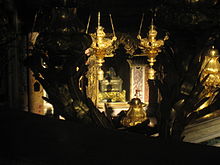 Looking down into the confessio near the tomb of Apostle Peter, Saint Peter's Basilica, Rome.
Looking down into the confessio near the tomb of Apostle Peter, Saint Peter's Basilica, Rome.
The Roman Martyrology assigns 29 June as the feast day of both Peter and Paul, without thereby declaring that to be the day of their deaths. St. Augustine of Hippo says in his Sermon 295: "One day is assigned for the celebration of the martyrdom of the two apostles. But those two were one. Although their martyrdom occurred on different days, they were one."
This is also the feast of both Apostles in the calendar of the Eastern Orthodox Church.
In the Roman Rite, the feast of the Chair of Saint Peter is celebrated on 22 February, and the anniversary of the dedication of the two papal basilicas of Saint Peter's and Saint Paul's outside the Walls is held on 18 November.
Before Pope John XXIII's revision in 1960, the Roman Calendar also included on 18 January another feast of the Chair of Saint Peter (denominated the Chair of Saint Peter in Rome, while the February feast was then called that of the Chair of Saint Peter at Antioch), and on 1 August the feast of Saint Peter in Chains.
St. Peter's Basilica
Main article: St. Peter's BasilicaIn the early 4th century, the Emperor Constantine I decided to honour Peter with a large basilica. Because the precise location of Peter's burial was so firmly fixed in the belief of the Christians of Rome, the church to house the basilica had to be erected on a site that was not convenient to construction. The slope of the Vatican Hill had to be excavated, even though the church could much more easily have been built on level ground only slightly to the south. There were also moral and legal issues, such as demolishing a cemetery to make room for the building. The focal point of the Basilica, both in its original form and in its later complete reconstruction, is the altar located over what is said to be the point of Peter's burial.
Protestants and other views
A major debate between Catholics and Protestants centers on Matthew 16:18 where Jesus tells Peter: "You are Peter, and on this rock I will build my Church..." Catholics interpret the verse as saying that Jesus would build his church on Peter, the apostle. The traditional Catholic interpretation has been that Jesus told Peter (Rock) that he would build his Church on this Rock (Peter), and that Peter was made the shepherd of the apostolic flock[Jn 21:15-19]—hence their assertion of the Primacy of the Roman Pontiff.
Meaning of "Rock"
In the original Greek the word translated as "Peter" is Πέτρος (Petros) and that translated as "rock" is πέτρα (petra), two words that, while not identical, give an impression of one of many times when Jesus used a play on words. Furthermore, since Jesus presumably spoke to Peter in their native Aramaic language, he would have used kepha in both instances.[67] The Peshitta Text and the Old Syriac text use the word "kepha" for both "Peter" and "rock" in Matthew 16:18.[68] John 1:42 says Jesus called Simon "Cephas", as does Paul in some letters. He was instructed by Christ to strengthen his brethren, i.e., the apostles.[Lk 22:31-32] Peter also had a leadership role in the early Christian church at Jerusalem according to The Acts of the Apostles chapters 1–2, 10–11, and 15.
Early Catholic Latin and Greek writers (such as St. John Chrysostom) considered the "foundation rock" as applying to both Peter personally and his confession of faith (or the faith of his confession) symbolically, as well as seeing Christ's promise to apply more generally to his twelve apostles and the Church at large.[69] This "double meaning" interpretation is present in the current Catechism of the Catholic Church.[70]
Protestant counter-claims to the Catholic interpretation are largely based on the difference between the Greek words translated "Rock" in the Matthean passage. In classical Attic Greek petros generally meant "pebble," while petra meant "boulder" or "cliff." Accordingly, taking Peter's name to mean "pebble," they argue that the "rock" in question cannot have been Peter, but something else, either Jesus himself, or the faith in Jesus that Peter had just professed. However, the New Testament was written in Koiné Greek, not Attic Greek, and some authorities say no significant difference existed between the meanings of petros and petra.
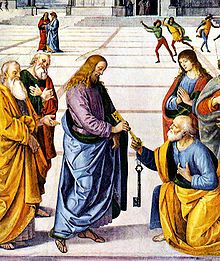 Christ Handing the Keys to St Peter, by Pietro Perugino (1481–82)
Christ Handing the Keys to St Peter, by Pietro Perugino (1481–82)
However, even though the feminine noun petra is translated as rock in the phrase "on this rock I will build my church," the word petra (πέτρα in Greek) is also used at 1 Cor. 10:4 in describing Jesus Christ, which reads: "They all ate the same spiritual food and drank the same spiritual drink; for they drank from the spiritual rock that accompanied them, and that rock was Christ."
Although Matthew 16 is used as a primary proof-text for the Catholic doctrine of Papal supremacy, Protestant scholars say that prior to the Reformation of the 16th century, Matthew 16 was very rarely used to support papal claims. Their position is that most of the early and medieval Church interpreted the 'rock' as being a reference either to Christ or to Peter's faith, not Peter himself. They understand Jesus' remark to have been his affirmation of Peter's testimony that Jesus was the Son of God.[71]
Other theologically conservative Christians, including Confessional Lutherans, also rebut comments made by Karl Keating and D.A. Carson who claim that there is no distinction between the words petros and petra in Koine Greek. The Lutheran theologians state that the dictionaries of Koine/NT Greek, including the authoritative[72] Bauer-Danker-Arndt-Gingrich Lexicon, indeed list both words and the passages that give different meanings for each. The Lutheran theologians further note that:
We honor Peter and in fact some of our churches are named after him, but he was not the first pope, nor was he Roman Catholic. If you read his first letter, you will see that he did not teach a Roman hierarchy, but that all Christians are royal priests. The same keys given to Peter in Matthew 16 are given to the whole church of believers in Matthew 18[73]
Partial Protestant support
Partial support for the Catholic position comes from one of Protestantism's most distinguished Church historians, Oscar Cullmann, a Lutheran theologian. He disagrees with Luther and the Protestant reformers who held that by "rock" Christ did not mean Peter, but meant either himself or the faith of His followers. He believes the meaning of the original Aramaic is very clear: that "Kepha" was the Aramaic word for "rock", and that it was also the name by which Christ called Peter.[74]
Yet, Cullmann sharply rejects the Catholic claim that Peter began the papal succession. He writes: "In the life of Peter there is no starting point for a chain of succession to the leadership of the church at large." While he believes the Matthew text is entirely valid and is in no way spurious, he says it cannot be used as "warrant of the papal succession."[74]
Cullmann concludes that while Peter was the original head of the apostles, Peter was not the founder of any visible church succession.[74]
There are other Protestant scholars who also partially defend the historical Catholic position about "Rock."[75] Taking a somewhat different approach from Cullman, they point out that the Gospel of Matthew was not written in the classical Attic form of Greek, but in the Hellenistic Koine dialect in which there is no distinction in meaning between petros and petra. Moreover, even in Attic Greek, in which the regular meaning of petros was a smallish "stone," there are instances of its use to refer to larger rocks, as in Sophocles, Oedipus at Colonus v. 1595, where petros refers to a boulder used as a landmark, obviously something more than a pebble. In any case, a petros/petra distinction is irrelevant considering the Aramaic language in which the phrase might well have been spoken. In Greek, of any period, the feminine noun petra could not be used as the given name of a male, which may explain the use of Petros as the Greek word with which to translate Aramaic Kepha.[67]
Yet, still other Protestant scholars believe that Jesus in fact did mean to single out Peter as the very rock which he will build upon, but that the passage does nothing to indicate a continued succession of Peter's implied position. They assert that Matthew uses the demonstrative pronoun taute, which allegedly means "this very" or this same, when he refers to the rock on which Jesus' church will be built. He also uses the Greek word for "and", kai. It is alleged that when a demonstrative pronoun is used with kai, the pronoun refers back to the preceding noun. The second rock Jesus refers to must then be the same rock as the first one; and if Peter is the first rock he must also be the second.[76]
Eastern Orthodox
The Eastern Orthodox Church regards Apostle Peter, together with Apostle Paul, as "Preeminent Apostles". Another title used for Peter is Coryphaeus, which could be translated as "Choir-director", or lead singer.[77] The church recognizes Apostle Peter's leadership role in the early church, especially in the very early days at Jerusalem, but does not consider him to have had any "princely" role over his fellow Apostles.
The New Testament is not seen by the Orthodox as supporting any extraordinary authority for Peter with regard to faith or morals. The Orthodox also hold that Peter did not act as leader at the Council of Jerusalem, but as merely one of a number who spoke. The final decision regarding the non-necessity of circumcision (and certain prohibitions) was spelled out by James, the Brother of the Lord (though Catholics hold James merely reiterated and fleshed out what Peter had said, regarding the latter's earlier divine revelation regarding the inclusion of Gentiles).
Eastern and Oriental Orthodox do not recognize the Bishop of Rome as the successor of St. Peter but the Ecumenical Patriarch of Constantinople sends a delegation each year to Rome to participate in the celebration of the feast of Sts. Peter and Paul. In the Ravenna Document of 13 October 2007, the representatives of the Eastern Orthodox Church agreed that "Rome, as the Church that 'presides in love' according to the phrase of St. Ignatius of Antioch (To the Romans, Prologue), occupied the first place in the taxis, and that the bishop of Rome was therefore the protos among the patriarchs, if the Papacy unites with the Orthodox Church. They disagree, however, on the interpretation of the historical evidence from this era regarding the prerogatives of the bishop of Rome as protos, a matter that was already understood in different ways in the first millennium."
With regard to Jesus' words to Peter, "Thou art Peter and upon this rock I will build my church", the Orthodox hold Christ is referring to the confession of faith, not the person of Peter as that upon which he will build the church. This is allegedly shown by the fact that the original Greek uses the feminine demonstrative pronoun when he says "upon this rock" (ταύτῃ τῇ πέτρᾳ); whereas, grammatically, if he had been referring to Peter, he would allegedly have used the masculine.[78] This "gender distinction" argument is also held by some Protestants.
Feast days
In the Orthodox Daily Office every Thursday throughout the year is dedicated to the Holy Apostles, including St. Peter. There are also two feast days in the year which are dedicated to him:
- June 29, Feast of Saints Peter and Paul—This is a major feast day and is preceded by a period of Lenten fasting known as the Apostles' Fast
- January 16, Veneration of the Precious Chains of the Holy and All-Glorious Apostle Peter—commemorating both the chains which Acts 12:1-11 says miraculously fell from him, and the chains in which he was held before his martyrdom by Nero.
Syriac Orthodox Church
The Fathers of the Syriac Orthodox Church tried to give a theological interpretation to the primacy of Apostle Peter. They were fully convinced of the unique office of Peter in the primitive Christian community. Ephrem, Aphrahat and Marutha who were supposed to be the best exponents of the early Syriac tradition unequivocally acknowledge the office of Peter.
The Syriac Fathers following the rabbinic tradition call Jesus “Kepha” for they see “rock” in the Old Testament as a messianic Symbol. When Christ gave his own name “Kepha” to Simon he was giving him participation in the person and office of Christ. Christ who is the Kepha and shepherd made Simon the chief shepherd in his place and gave him the very name Kepha and said that on Kepha he would build the Church. Aphrahat shared the common Syriac tradition. For him Kepha is in fact another name of Jesus, and Simon was given the right to share the name. The person who receives somebody else’s name also obtains the rights of the person who bestows the name. Aphrahat makes the stone taken from Jordan a type of Peter. He says Jesus son of Nun set up the stones for a witness in Israel; Jesus our Saviour called Simon Kepha Sarirto and set him as the faithful witness among nations.
Again he says in his commentary on Deuteronomy that Moses brought forth water from “rock” (Kepha) for the people and Jesus sent Simon Kepha to carry his teachings among nations. Our Lord accepted him and made him the foundation of the Church and called him Kepha. When he speaks about transfiguration of Christ he calls him Simon Peter, the foundation of the Church. Ephrem also shared the same view. In Armenian version of De Virginitate records Peter the Rock shunned honour Who was the head of the Apostles. In a mimro of Efrem found in Holy Week Liturgy points to the importance of Peter.
Both Aphrahat and Ephrem represent the authentic tradition of the Syrian Church. The different orders of liturgies used for sanctification of Church building, marriage, ordination etc. reveal that the primacy of Peter is a part of living faith of the Church.[79]
New Apostolic Church
The New Apostolic Church, who believes in the re-established Apostle ministry, sees Peter as the first Chief Apostle.
Latter Day Saint movement
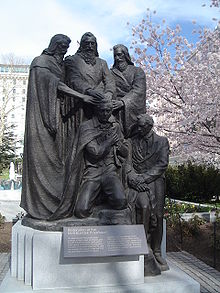 Bronze statue on the LDS Church's Temple Square (Salt Lake City, Utah, USA) depicting Peter, James, and John conferring the Melchizedek priesthood in 1829 on Joseph Smith and Oliver Cowdery
Bronze statue on the LDS Church's Temple Square (Salt Lake City, Utah, USA) depicting Peter, James, and John conferring the Melchizedek priesthood in 1829 on Joseph Smith and Oliver Cowdery
The Church of Jesus Christ of Latter-day Saints (LDS Church or "Mormons") along with other sects of the Latter Day Saint movement believe that Peter was the first leader of the early Christian church, but reject papal succession. In interpreting Matthew 16:13–19 the LDS Church has stated, "The words then addressed to him, 'Thou art Peter, and upon this rock I will build my church,' have been made the foundation of the papal claims. But it is the Godhead of Christ, which Peter had just confessed, that is the true keystone of the Church."[80] Latter-day saints believe that Peter, James, and John. came from heaven and conferred the keys of the Melchizedek Priesthood upon Joseph Smith and Oliver Cowdery in 1829, near Harmony Township, Susquehanna County, Pennsylvania as part of the restoration of priesthood authority.[81]
Islamic literature
Main article: Saint Peter and IslamMuslims accept Jesus as a prophet of Islam. The Qur'an also speaks of Jesus's disciples but does not mention their names, instead referring to them as "helpers to the work of God".[82] Muslim exegesis and Qur'an commentary, however, names them and includes Peter amongst the disciples.[1] An old tradition, which involves the legend of Habib the Carpenter, mentions that Peter was one of the three disciples sent to Antioch to preach to the people there.[83]
Shia Muslims see a parallel in the figure of Peter to Ali at Muhammad's time. They look upon Ali as being the vicegerent, with Muhammad being the prophet; likewise, they see Peter as the vicegerent, behind Jesus the prophet and messiah. Peter's role as the first proper leader of the church is also seen by Shia's to be a parallel to their belief in Ali as the first caliph after Muhammad.[84]
Jewish folklore
Main article: Saint Peter and JudaismAccording to Jewish folklore (Toledot Yeshu narrative), St. Peter (Shimeon Kepha Ha-Tzadik) had a pristine reputation as a greatly learned and holy man.
Writings
Traditionally, two canonical epistles (1 and 2 Peter) and several apocryphal works have been attributed to Peter.
New Testament
The New Testament includes two letters (epistles) ascribed to Peter. Both demonstrate a high quality of cultured and urban Greek, at odds with the linguistic skill that would ordinarily be expected of an Aramaic-speaking fisherman, who would have learned Greek as a second or third language. However, the author of the first epistle explicitly claims to be using a secretary (see below), and this explanation would allow for discrepancies in style without entailing a different source. The textual features of these two epistles are such that a majority of scholars doubt that they were written by the same hand. This means at the most that Peter could not have authored both, or at the least that he used a different secretary for each letter. Some scholars argue that theological differences imply different sources, and point to the lack of references to 2 Peter among the early Church Fathers.
Of the two epistles, the first epistle is considered the earlier. A number of scholars have argued that the textual discrepancies with what would be expected of the biblical Peter are due to it having been written with the help of a secretary or as an amanuensis. Indeed in the first epistle the use of a secretary is clearly described: "By Silvanus, a faithful brother unto you, as I suppose, I have written briefly, exhorting, and testifying that this is the true grace of God wherein ye stand".[1 Pet. 5:12] Thus, in regards to at least the first epistle, the claims that Peter would have written Greek poorly seem irrelevant. The references to persecution of Christians, which only began under Nero, cause most scholars to date the text to at least the year 80, which would require Peter to have survived to an age that was, at that time, extremely old, and almost never reached, particularly by common fishermen. However, the Roman historian Tacitus and the biographer Suetonius both record that Nero's persecution of Christians began immediately after the fire that burned Rome in 64. Such a date, which is in accord with Christian tradition, especially Eusebius (History book 2, 24.1), would not have Peter at an improbable age upon his death. On the other hand, many scholars consider this in reference to the persecution of Christians in Asia Minor during the reign of the emperor Domitian (81–96).
In the salutation of the First Epistle of Peter, the writer refers to the diaspora, which did not occur until 136: Peter, an apostle of Jesus Christ, to God's elect, strangers in the world, scattered throughout Pontus, Galatia, Cappadocia, Asia and Bithynia, who have been chosen according to the foreknowledge of God the Father, through the sanctifying work of the Spirit, for obedience to Jesus Christ and sprinkling by his blood: Grace and peace be yours in abundance.
The Second Epistle of Peter, on the other hand, appears to have been copied, in part, from the Epistle of Jude, and some modern scholars date its composition as late as c. 150. Some scholars argue the opposite, that the Epistle of Jude copied 2 Peter, while others contend an early date for Jude and thus observe that an early date is not incompatible with the text. Many scholars have noted the similarities between the apocryphal Second Epistle of Clement (2nd century) and 2 Peter. Second Peter may be earlier than 150, there are a few possible references to it that date back to the 1st century or early 2nd century, e.g., 1 Clement written in c. AD 96, and the later church historian Eusebius claimed that Origen had made reference to the epistle before 250. Even in early times there was controversy over its authorship, and 2 Peter was often not included in the Biblical Canon; it was only in the 4th century that it gained a firm foothold in the New Testament, in a series of synods. In the east the Syrian Orthodox Church still did not admit it into the canon until the 6th century.
Traditionally, the Gospel of Mark was said to have been written by a person named John Mark, and that this person was an assistant to Peter, hence its content was traditionally seen as the closest to Peter's viewpoint. According to Eusebius's Ecclesiastical History, Papias recorded this belief from John the Presbyter:
Mark having become the interpreter of Peter, wrote down accurately whatsoever he remembered. It was not, however, in exact order that he related the sayings or deeds of Christ. For he neither heard the Lord nor accompanied Him. But afterwards, as I said, he accompanied Peter, who accommodated his instructions to the necessities [of his hearers], but with no intention of giving a normal or chronological narrative of the Lord's sayings. Wherefore Mark made no mistake in thus writing some things as he remembered them. For of one thing he took especial care, not to omit anything he had heard, and not to put anything fictional into the statements[85]
Also Irenaeus wrote about this tradition:
After their (Peter and Paul's) passing, Mark also, the disciple and interpreter of Peter, transmitted to us in writing the things preached by Peter.[86]
Based on these quotes, and on the Christian tradition, the information in Mark's Gospel about St. Peter would be based on eyewitness material. It should be noted, however, that some scholars (for differing reasons) dispute the attribution of the Gospel of Mark to its traditional author. The gospel itself is anonymous, and the above passages are the oldest surviving written testimony to its authorship.
Pseudepigrapha and apocrypha
There are also a number of other apocryphal writings, not recognized by the Church, that have been either attributed to or written about St. Peter. They were from antiquity regarded as pseudepigrapha.[citation needed] These include:
- Gospel of Peter, a partially Docetic narrative that has survived in part
- Acts of Peter
- Acts of Peter and Andrew
- Acts of Peter and Paul
- Acts of Peter and the Twelve
- Gnostic Apocalypse of Peter
- A Letter of Peter to Philip, which was preserved in the Nag Hammadi library
- Apocalypse of Peter, which was considered as genuine by many Christians as late as the 4th century
- The Epistula Petri, the introductory letter ascribed to Apostle Peter that appears at the beginning of at least one version of the Clementine literature
Popular culture
Over the years "St. Peter" has evolved into a stock character that is now widely used in jokes, cartoons, comedies, dramas, and plays. Such caricatures almost all play upon Peter's role as the "keeper of the keys of the kingdom of heaven" in Matthew 16:19, on the basis of which he is often depicted as an elderly, bearded man who sits at the pearly gates that serve as heaven's main entrance, often portrayed as a sort of hotel-style doorman / bouncer who personally interviews prospective entrants into Heaven, often seated behind a desk, or standing at a lectern. He usually has a big book in which the names of the saved are written.
In traditional Medieval iconography, Peter is a bald man with a long beard. He usually has one or more large keys in his hand or hanging from his belt.
In the 2004 movie Millions, St. Peter appears to the boy Damian, referring to himself as the "patron saint of keys, locks, and general security."
Patronage
Saint Peter is the patron saint of the following categories[citation needed]
Workers - Cordwainers
- Life New Lifes
- Horologists
- Locksmiths
- Cobblers
Called for aid in - Frenzy
- Foot problems
Institutions - Bath Abbey
- Berchtesgaden Provostry
- Bishop Cotton Boys' School, Bangalore
- Peterhouse, Cambridge
- St Peter's College, Oxford
- St Peter's College, Auckland
- Saint Peter's College, New Jersey
- Saint Peter's School, York
Churches and Cathedrals Locations - Birżebbuġa
- Bremen
- Brgy. San Pedro, San Pablo City
- Worms
- Calatrava
- Chartres
- Chimbote
- Calbayog City
- Cologne
- Davao
- Dunajská Streda
- Ilovik i Sveti Petar
- Jackson
- Köpenick
- Regensburg
- Rome
- Póvoa de Varzim
- Saint Petersburg
- Saint Pierre and Miquelon
- San Pedro, Laguna
- San Pedro Soloma
- Scranton
- Seixal Municipality
- Sunderland
- Sintra
- Sint-Pieters-Rode
- Tielt
- Toa Baja
- Umbria
Holy relics
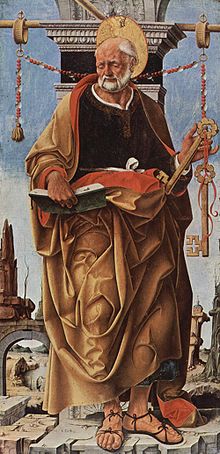 Pius XII ordered archaeological excavations under St Peter's Basilica in Rome to determine whether the tomb of St Peter was there. At the conclusion of the Holy Year in 1950 he confirmed that the tomb of Peter had been found underneath the basilica[87]
Pius XII ordered archaeological excavations under St Peter's Basilica in Rome to determine whether the tomb of St Peter was there. At the conclusion of the Holy Year in 1950 he confirmed that the tomb of Peter had been found underneath the basilica[87]
Pope Vitalian sent filings from Apostle Peter's chains to Oswy, King of Northumbria in the 7th century.[88]
Peter's remains continue to be subject of investigation, but his tomb is located under Saint Peter's Basilica in the Vatican, which was announced by Pope Pius XII on Christmas Day in 1950 after years of painstaking research.[87]
Revisionist views
Many Protestant scholars accept the traditional story of Peter's martyrdom in Rome. Some Protestants, however, have rejected Peter's martyrdom as a later invention, arguing that evidence of Peter exists only in Biblical accounts.
It has also been claimed that there was a serious division between Peter's Jewish Christian party and Paul's Hellenizing party, seen in e.g. the Incident at Antioch, which later Christian accounts have downplayed.[89]
Another revisionist view was developed by supporters of the Christ myth theory, which holds that the figure of Peter is largely a development from some mythological doorkeeper figures. According to Arthur Drews and G. A. Wells, if there was a historical Peter, then all that is known about him is the brief mentions in Galatians.[90][91]
See also
- Peter and Paul
- Quo Vadis
- Saint Peter and Islam
- Saint Peter's Square
- Saint Peter's tomb
- Saint Peter and Judaism
- San Pietro in Vincoli
- St. Peter's Basilica
- Sword of Saint Peter
- The Big Fisherman
Notes
- ^ a b Historical Dictionary of Prophets In Islam And Judaism, Brandon M. Wheeler, Disciples of Christ: "Muslim exegesis identifies the disciples as Peter, Andrew, Matthew, Thomas, Philip, John, James, Bartholomew, and Simon"
- ^ "The Patriarchate of Antioch: Founded by Saints Peter and Paul". http://www.antiochian.org/patofant.
- ^
 "Fathers of the Church". Catholic Encyclopedia. New York: Robert Appleton Company. 1913. .
"Fathers of the Church". Catholic Encyclopedia. New York: Robert Appleton Company. 1913. . - ^ Thomas Patrick Halton, On Illustrious Men, v. 100, CUA Press, 1999, pp 5–7 ISBN 0-8132-0100-4.
- ^ The Early Church Fathers Chapter 1
- ^ a b c d e f g h i j k "Peter, St. " F. L., Cross, The Oxford dictionary of the Christian Church, Oxford University Press, 2005
- ^ "Bible Lexicon". Bible Lexicon. http://www.biblelexicon.org/matthew/16-18.htm. Retrieved 2010-09-12.
- ^ John Maclean, M.A., F.R.G.S. "A Dictionary of the Dialects of Vernacular Syriac as Spoken by the Eastern Syrians of Kurdistan, Northwest Persia, and the Plain of Moṣul" Cambridge at the University Press, 1895. Accessed Jun. 16, 2011: p. 124.
- ^ e.g., Marcus Jastrow "Dictionary of the Targumim, the Talmud Babli and Yerushalmi, and the Midrashic Literature" Printed 1903. Accessed Jun. 16, 2011: P. 634
- ^ a b Karl Feyerabend, PhD "A complete Hebrew-English pocket-dictionary to the Old Testament" Cöthen, Germany, 1910. Accessed Jun. 16, 2011: P. 233
- ^ A. S. Waldstein "English-Hebrew dictionary" Jerusalem, 1920. Accessed Jun. 16, 2011: P. 442
- ^ His father's name is given as 'Jonah',[Jn. 1:42] [Matt. 16:17] although some manuscripts of John give his father's name as John.
- ^ Harrington, Daniel J. "Peter the Rock." America, August 18–25, 2008. Accessed Oct. 9, 2009: p. 30.
- ^ Rienecker, Fritz; Rogers, Cleon (1976). Linguistic key to the Greek New Testament. Grand Rapids MI: Regency Reference Library (Zondervan Publishing House). p. 49. ISBN 0-310-32050-X
- ^ "Saint Peter the Apostle." Encyclopædia Britannica. 2009. Encyclopædia Britannica Online. 25 Nov. 2009 [1].
- ^ Matt. 10:2-4, Mk. 3:16-19, Lk. 6:14-16
- ^ a b c "Sermon by Leo the Great (440–461)". Ccel.org. 2005-07-13. http://www.ccel.org/ccel/schaff/npnf212.ii.v.xlii.html. Retrieved 2010-09-12.
- ^ "Archbishop Stylianos of Australia". http://www.greekorthodox.org.au/downloads/files/english/voo/2005/11VOO05E. Retrieved 2010-09-12.
- ^ "Patriarch H.H.Ignatius Zakka I Iwas". Syrianchurch.org. http://www.syrianchurch.org/PZakka/Jubilee.htm. Retrieved 2010-09-12.
- ^ Identity of the Syriac Orthodox Church[dead link]
- ^ http://cbi.sagepub.com/cgi/reprint/5/1/73.pdf
- ^ "[Church History Book II, Chapter I, quoting Clement of Alexandria's Sixth book of Hypotyposes". Newadvent.org. http://www.newadvent.org/fathers/250102.htm. Retrieved 2010-09-12.
- ^ Matt. 26:51, Mk. 14:47, Lk. 22:50
- ^ a b May, Herbert G. and Bruce M. Metzger. The New Oxford Annotated Bible with the Apocrypha. 1977.
- ^ 1Cor 15
- ^ 1Cor 15:3-7
- ^ See Matthew 28:8-10, John 20:16 and Luke 24:13-16.
- ^ Brodie, T. L. (1997). The Gospel according to John a literary and theological commentary. New York: Oxford University Press. pg. 574
- ^ John Vidmar, The Catholic Church through the ages: a history. pp. 39–40. Books.google.com. 2005-07. ISBN 9780809142347. http://books.google.com/books?id=zENJHwQqSy0C&printsec=frontcover&dq=John+Vidmar#v=onepage&q=Both%20Catholic%20and%20Protestant%20scholars%20agree&f=false. Retrieved 2010-09-12.
- ^ a b c d Harris, Stephen L., Understanding the Bible. Palo Alto: Mayfield. 1985.
- ^ Louise Ropes Loomis, The Book of Popes (Liber Pontificalis). Merchantville, NJ: Evolution Publishing. ISBN 1-889758-86-8 (Reprint of the 1916 edition).
- ^ This is provided in Downey, A History of Antioch, pp. 583–586. This evidence is accepted by M. Lapidge, among others, see Bischoff and Lapidge, Biblical Commentaries from the Canterbury School (Cambridge, 1994) p. 16. Lastly, see Finegan, The Archaeology of the New Testament, pp. 63–71.
- ^ (ἡ δ᾿ ἱστορία παρὰ Κλήμεντι κατὰ τὴν πέμπτην τῶν Ὑποτυπώσεων· ἐν ᾗ καὶ Κηφᾶν, περὶ οὗ φησιν ὁ Παῦλος· «ὅτε δὲ ἦλθεν Κηφᾶς εἰς Ἀντιόχειαν, κατὰ πρόσωπον αὐτῷ ἀντέστην», ἕνα φησὶ γεγονέναι τῶν ἑβδομήκοντα μαθητῶν, ὁμώνυμον Πέτρῳ τυγχάνοντα τῷ ἀποστόλῳ.)
- ^ Granger Ryan & Helmut Ripperger, The Golden Legend Of Jacobus De Voragine Part One, 1941.
- ^ "Jesus said this to indicate the kind of death by which Peter would glorify God" ([Jn. 21:19]).
- ^ Walsh, The Bones of St. Peter: A 1st Full Account of the Search for the Apostle's Body
- ^ Finegan, The Archeology of the New Testament, pp. 368–370.
- ^ "The Bones of St. Peter". Saintpetersbasilica.org. http://www.saintpetersbasilica.org/Necropolis/JW/TheBonesofStPeter-1.htm. Retrieved 2010-09-12.
- ^ "Venerable Bede,Historia Ecclesiastica Gentis Anglorum: The Ecclesiastical History of the English People. Book III, Chapter 29". Fordham.edu. http://www.fordham.edu/halsall/basis/bede-book3.html. Retrieved 2010-09-12.
- ^ The evidence that Peter was "bishop" of Rome is corroborated by both positive and "negative" evidence. Positively, Clement's letter to the Corinthians situates Peter in Rome by mentioning his death there. Ignatius of Antioch writes to the Romans and says, "I do not command you as Peter and Paul did." The lists of Roman bishops given by Irenaeus and Tertullian support this, as does the honor given Peter's supposed burial place on Vatican Hill. Eamon Duffy's text for a BBC production, Saints and Sinners, soft-pedals the position of Peter as bishop. Duffy claims that there were five Christian neighborhoods in Rome, and that Peter could not possibly have been supervisor over all of them. One argument against this is the fact that the historical letters (from Paul, Ignatius, and Clement) are all addressed to "the Romans," and not one particular community in Rome. Historians cite negative evidence as well, namely that there is no rival tradition. No other city claims Peter as its bishop except Antioch, and even it conceded that Peter had moved on to Rome." John Vidmar
- ^ Brown, Raymond E. and Meier, John P. (1983). Antioch and Rome: New Testament Cradles of Christianity. Paulist Press. p. 98. ISBN 0809103397. "As for Peter, we have no knowledge at all of when he came to Rome and what he did there before he was martyred. Certainly he was not the original missionary who brought Christianity to Rome (and therefore not the founder of the church of Rome in that sense). There is no serious proof that he was the bishop (or local ecclesiastical officer) of the Roman church—a claim not made till the third century. Most likely he did not spend any major time at Rome before 58 when Paul wrote to the Romans, and so it may have been only in the 60s and relatively shortly before his martyrdom that Peter came to the capital."
- ^ Cullmann, Oscar (1962). Peter: Disciple, Apostle, Martyr, 2nd ed.. Westminster Press. p. 234. ""In the New Testament [Jerusalem] is the only church of which we hear that Peter stood at its head. Of other episcopates of Peter we know nothing certain. Concerning Antioch, indeed… there is a tradition, first appearing in the course of the second century, according to which Peter was its bishop. The assertion that he was Bishop of Rome we first find at a much later time. From the second half of the second century we do possess texts that mention the apostolic foundation of Rome, and at this time, which is indeed rather late, this foundation is traced back to Peter and Paul, an assertion that cannot be supported historically. Even here, however, nothing is said as yet of an episcopal office of Peter.""
- ^ Chadwick, Henry (1993). The Early Church, rev. ed.. Penguin Books. p. 18. "No doubt Peter's presence in Rome in the sixties must indicate a concern for Gentile Christianity, but we have no information whatever about his activity or the length of his stay there. That he was in Rome for twenty-five years is third-century legend."
- ^ J.N.D. Kelly, Oxford Dictionary of the Popes (Oxford University Press, 1996), p. 6. "Ignatius assumed that Peter and Paul wielded special authority over the Roman church, while Irenaeus claimed that they jointly founded it and inaugurated its succession of bishops. Nothing, however, is known of their constitutional roles, least of all Peter's as presumed leader of the community."
- ^ Building Unity, Ecumenical Documents IV (Paulist Press, 1989), p. 130. "There is increasing agreement that Peter went to Rome and was martyred there, but we have no trustworthy evidence that Peter ever served as the supervisor or bishop of the local church in Rome."
- ^ "most scholars, both Roman Catholic and Protestant,concur that Peter died in Rome" Keener, Craig S., The Gospel of Matthew: A Socio-Rhetorical Commentary, p. 425, n. 74, 2009 Wm. B. Eerdmans Publishing Company
- ^ "[M]any scholars… accept Rome as the location of the martyrdom and the reign of Nero as the time." Daniel William O’Connor, "Saint Peter the Apostle." Encyclopædia Britannica. 2009. Encyclopædia Britannica Online. 25 Nov. 2009 [2].
- ^ a b c Pieter Willem van der Horst, review of Otto Zwierlein, Petrus in Rom: die literarischen Zeugnisse. Mit einer kritischen Edition der Martyrien des Petrus und Paulus auf neuer handschriftlicher Grundlage, Berlin: Walter de Gruyter, 2009, in Bryn Mawr Classical Review 2010.03.25.
- ^ James Dunn, review of Zwierlein 2009, in Review of Biblical Literature 2010
- ^ "Irenaeus Against Heresies 3.3.2". http://www.ccel.org/ccel/schaff/anf01.ix.iv.iv.html. "…[the] Church founded and organized at Rome by the two most glorious apostles, Peter and Paul; as also [by pointing out] the faith preached to men, which comes down to our time by means of the successions of the bishops… The blessed apostles, then, having founded and built up the Church, committed into the hands of Linus the office of the episcopate."
- ^ Letter to Pope Soter AD 170, in Eusebius, History of the Church 2:25:8
- ^ ""Rome", ''Catholic Encyclopedia''". Newadvent.org. 1912-02-01. http://www.newadvent.org/cathen/13164a.htm. Retrieved 2010-09-12.
- ^ Cross, FL, ed. The Oxford dictionary of the Christian church. New York: Oxford University Press. 2005, article Rome (early Christian)
- ^ "Gospel of Thomas 13". http://www.misericordia.edu/users/davies/thomas/Trans.htm.
- ^ "Gospel of Thomas 114". http://www.misericordia.edu/users/davies/thomas/Trans.htm.
- ^ "Apocalypse of Peter". http://www.earlychristianwritings.com/text/apocalypsepeter-mrjames.html.
- ^ "Gospel of Mary 9:4". http://www.gnosis.org/library/marygosp.htm.
- ^ "Gospel of Mary 9:6". http://www.gnosis.org/library/marygosp.htm.
- ^ "Gospel of Peter 14:3". Cygnus-study.com. http://www.cygnus-study.com/pagepet.html. Retrieved 2010-09-12.
- ^ "Doctrine & Covenants 27:12–13". Scriptures.lds.org. http://scriptures.lds.org/en/dc/27/12-13#12. Retrieved 2010-09-12.
- ^ "Doctrine & Covenants 128:20–21". Scriptures.lds.org. http://scriptures.lds.org/en/dc/128/20-21#20. Retrieved 2010-09-12.
- ^ a b
 "The Pope". Catholic Encyclopedia. New York: Robert Appleton Company. 1913.
"The Pope". Catholic Encyclopedia. New York: Robert Appleton Company. 1913. - ^ Wilken, p. 281, quote: "Some (Christian communities) had been founded by Peter, the disciple Jesus designated as the founder of his church. ... Once the position was institutionalized, historians looked back and recognized Peter as the first pope of the Christian church in Rome"
- ^ "Greek New Testament" Greek New Testament. John xxi 11 Jun. 2010.
- ^ Basil li. De poenit. cƒ. Matth. v. 14 ; Luke xxii. 19
- ^ "Saint Peter the Apostle." Encyclopædia Britannica. 2009. Encyclopædia Britannica Online. 25 Nov. 2009.
- ^ a b "http://www.catholic.com/library/Peter_the_Rock.asp". Catholic.com. 2004-08-10. http://www.catholic.com/library/Peter_the_Rock.asp. Retrieved 2010-09-12.
- ^ "http://www.peshitta.org/pdf/Mattich16.pdf" (PDF). http://www.peshitta.org/pdf/Mattich16.pdf. Retrieved 2010-09-12.
- ^ Veselin Kesich (1992). "Peter's Primacy in the New Testament and the Early Tradition" in The Primacy of Peter. St. Vladimir's Seminary Press. pp. 61–6.
- ^ Catechism of the Catholic Church, Articles 424 and 552
- ^ Mathison, Keith A., The Shape of Sola Scriptura, pp. 184–5.
- ^ Rykle Borger, "Remarks of an Outsider about Bauer's Worterbuch, BAGD, BDAG, and Their Textual Basis," Biblical Greek Language and Lexicography: Essays in Honor of Frederick W. Danker, Bernard A. Tayler (et al. eds.) pp. 32–47.
- ^ WELS Topical Q&A
- ^ a b c Monday, Dec. 07, 1953 (1953-12-07). "Religion: Peter & the Rock". TIME. http://www.time.com/time/magazine/article/0,9171,890753-1,00.html. Retrieved 2010-09-12.
- ^ D. A. Carson in The Expositor's Bible Commentary (Grand Rapids: Zondervan, 1984).
- ^ Jesus, Peter & the Keys: A Scriptural Handbook on the Papacy
- ^ John Meyendorff, et al. (1963), The Primacy of Peter in the Orthodox Church (St. Vladimir's Seminary Press, Crestwood NY, ISBN 978-0-88141-125-6)
- ^ Holy Apostles Convent (1999) The Orthodox New Testament, Vol. I: The Holy Gospels (Dormition Skete, Buena Vista CO, ISBN 0-944359-13-2) p. 105
- ^ ""Primacy of St. Peter" - by Dr. Thomas Athanasius". Syrianchurch.org. http://www.syrianchurch.org/Articles/PrimacyofStPeter.htm. Retrieved 2010-09-12.
- ^ "LDS Bible Dictionary—Peter". Scriptures.lds.org. http://scriptures.lds.org/en/bd/p/27. Retrieved 2010-09-12.
- ^ Doctrine & Covenants 27: 12–13
- ^ Qur'an 3:49-53
- ^ Hughes Dictionary of Islam, Habib the Carpenter
- ^ No god but God, Reza Aslan, Dictionary: Simon Peter
- ^ Eusebius, Ecclesiastical History, 3.39.14–16
- ^ Irenaeus, Against Heresies, III. 1.2.; quoted by Eusebius in Ecclesiastical History, book 5, 7.6
- ^ a b Domenico Cardinale Tardini, Pio XII, Tipografia Poliglotta Vaticana, 1960, p. 76.
- ^ Wall, J. Charles. (1912), Porches and Fonts. Pub. London: Wells Gardner and Darton. P. 295.
- ^ White, L. Michael (2004). From Jesus to Christianity. HarperSanFrancisco. pp. 170. ISBN 0–06–052655–6.
- ^ "Arthur Drews - The Legend of St. Peter". Egodeath.com. 2005-10-10. http://www.egodeath.com/arthurdrewslegendstpeter.htm. Retrieved 2010-09-12.
- ^ George Albert Wells, "St. Peter as Bishop of Rome"
External links
- Church Fathers on the Peter's Primacy
- Church Fathers on Peter's Succcessors
- The Life & Miracles of St. Peter, Prince of the Apostles
- Etymology of Peter
- The Jewish St Peter
- Jewish Encyclopedia: Simon Cephas
 "Epistles of Saint Peter". Catholic Encyclopedia. New York: Robert Appleton Company. 1913.
"Epistles of Saint Peter". Catholic Encyclopedia. New York: Robert Appleton Company. 1913. - Veneration of the Precious Chains of the Holy and All-Glorious Apostle Peter Orthodox icon and synaxarion
- The Holy Glorious and All-Praised Leader of the Apostles, Peter icon and synaxarion
- The Holy Glorious and All-Praised Leader of the Apostles, Peter & Paul sermon of Saint Augustine, Bishop of Hippo
- Catholic response to Protestant claims that Peter never visited Rome
- stpetersbasilica.org Books on St. Peter's Basilica in Rome
Catholic Church titles New creation Pope
53–64Succeeded by
LinusNew creation Bishop of Antioch
37–53Succeeded by
Evodiusv · d · eTwelve Apostles of Jesus Christ Peter · Andrew · James son of Zebedee · John the Apostle · Philip · Bartholomew · Thomas
Matthew · James son of Alphaeus · Jude · Simon the Zealot · Judas Iscariot · Matthiasv · d · eHistory of Christianity Centuries: 1st 2nd 3rd 4th 5th 6th 7th 8th 9th 10th 11th 12th 13th 14th 15th 16th 17th 18th 19th 20th 21st • Early • Roman • Medieval • Modern
Jesus and the Apostolic Age Background · Ministry · Good News · Crucifixion & Resurrection · Holy Spirit · Gospels · Acts · The 12 · Paul · Acts 15
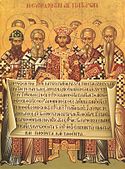
Ante-Nicene Period Judaism split · Justin Martyr · Ignatius · Persecution · Fathers · Irenaeus · Marcionism · Canon · Tertullian · Montanism · Origen
Christian Empire Constantine the Great · Monasticism · Councils: Nicaea I · Creed · Athanasius · Arianism · Jerome · Augustine · Councils II · III · IV
Eastern Christianity Orthodoxy · Greece · Asia · Church of the East · Oriental Orthodoxy · Coptic · Nestorianism · Syria · Armenia · Ethiopia · Chrysostom · Iconoclasm · Bulgaria · Great Schism · Fall · Ottoman · Russia · America · 20th century
Middle Ages Pelagianism · Gregory I · Celtic · Germanic & Scandinavian · Kievan Rus' · Investiture · Anselm · Abelard · Bernard of Clairvaux · Crusades · Inquisition · Scholasticism · Dominic · Francis · Bonaventure · Aquinas · Wycliffe · Avignon · Papal Schism · Jan Hus · Conciliarism
Protestant
ReformationProtestantism · Erasmus · Five solas · Eucharist · Calvinist v. Arminian · Arminianism · Dort · Wars
Lutheranism · Martin Luther · 95 Theses · Diet of Worms · Melanchthon · Orthodoxy · Eucharist · Book of Concord
Reformed · Zwingli · Calvin · Calvinism history · Scotland · Knox · TULIP · Dort · Westminster
Anglicanism · Timeline · Henry VIII · Cranmer · Settlement · 39 Articles · Common Prayer · Puritans · Civil War
Anabaptism · Radical Reformation · Grebel · Swiss Brethren · Müntzer · Martyrs' Synod · Menno Simons · SmythCatholicism Primacy development · Papacy · Timeline · Lateran IV · Trent · Counter-Reformation · Thomas More · Leo X · Guadalupe · Jesuits · Jansenists · Xavier · Monastery dissolution · Wars · Teresa · Vatican I & II · Modernism
Modern Christianity
and RevivalismEnglish denominations · Baptists · Congregationalism · Great Awakening · Methodism · Millerism · Pietism · Neo- & Old Lutherans · Restoration Movement · Jehovah's Witnesses · Mormonism · Seventh-day Adventism
Industrial Age Age of Ideologies Timeline · Missions Timeline · Martyrs · Theology · Eastern Orthodoxy · Oriental Orthodoxy · Protestantism · Catholicism
v · d · ePopes of the Catholic Church 1st–4th centuries Peter · Linus · Anacletus · Clement I · Evaristus · Alexander I · Sixtus I · Telesphorus · Hyginus · Pius I · Anicetus · Soter · Eleuterus · Victor I · Zephyrinus · Callixtus I · Urban I · Pontian · Anterus · Fabian · Cornelius · Lucius I · Stephen I · Sixtus II · Dionysius · Felix I · Eutychian · Caius · Marcellinus · Marcellus I · Eusebius · Miltiades · Sylvester I · Mark · Julius I · Liberius · Damasus I · Siricius · Anastasius I
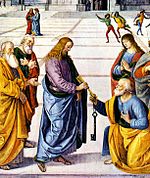
5th–8th centuries Innocent I · Zosimus · Boniface I · Celestine I · Sixtus III · Leo I · Hilarius · Simplicius · Felix III · Gelasius I · Anastasius II · Symmachus · Hormisdas · John I · Felix IV · Boniface II · John II · Agapetus I · Silverius · Vigilius · Pelagius I · John III · Benedict I · Pelagius II · Gregory I · Sabinian · Boniface III · Boniface IV · Adeodatus I · Boniface V · Honorius I · Severinus · John IV · Theodore I · Martin I · Eugene I · Vitalian · Adeodatus II · Donus · Agatho · Leo II · Benedict II · John V · Conon · Sergius I · John VI · John VII · Sisinnius · Constantine · Gregory II · Gregory III · Zachary · Stephen II · Paul I · Stephen III · Adrian I · Leo III
9th–12th centuries Stephen IV · Paschal I · Eugene II · Valentine · Gregory IV · Sergius II · Leo IV · Benedict III · Nicholas I · Adrian II · John VIII · Marinus I · Adrian III · Stephen V · Formosus · Boniface VI · Stephen VI · Romanus · Theodore II · John IX · Benedict IV · Leo V · Sergius III · Anastasius III · Lando · John X · Leo VI · Stephen VII · John XI · Leo VII · Stephen VIII · Marinus II · Agapetus II · John XII · Benedict V · Leo VIII · John XIII · Benedict VI · Benedict VII · John XIV · John XV · Gregory V · Sylvester II · John XVII · John XVIII · Sergius IV · Benedict VIII · John XIX · Benedict IX · Sylvester III · Gregory VI · Clement II · Damasus II · Leo IX · Victor II · Stephen IX · Nicholas II · Alexander II · Gregory VII · Victor III · Urban II · Paschal II · Gelasius II · Callixtus II · Honorius II · Innocent II · Celestine II · Lucius II · Eugene III · Anastasius IV · Adrian IV · Alexander III · Lucius III · Urban III · Gregory VIII · Clement III · Celestine III · Innocent III
13th–16th centuries Honorius III · Gregory IX · Celestine IV · Innocent IV · Alexander IV · Urban IV · Clement IV · Gregory X · Innocent V · Adrian V · John XXI · Nicholas III · Martin IV · Honorius IV · Nicholas IV · Celestine V · Boniface VIII · Benedict XI · Clement V · John XXII · Benedict XII · Clement VI · Innocent VI · Urban V · Gregory XI · Urban VI · Boniface IX · Innocent VII · Gregory XII · Martin V · Eugene IV · Nicholas V · Callixtus III · Pius II · Paul II · Sixtus IV · Innocent VIII · Alexander VI · Pius III · Julius II · Leo X · Adrian VI · Clement VII · Paul III · Julius III · Marcellus II · Paul IV · Pius IV · Pius V · Gregory XIII · Sixtus V · Urban VII · Gregory XIV · Innocent IX · Clement VIII
17th century–present Leo XI · Paul V · Gregory XV · Urban VIII · Innocent X · Alexander VII · Clement IX · Clement X · Innocent XI · Alexander VIII · Innocent XII · Clement XI · Innocent XIII · Benedict XIII · Clement XII · Benedict XIV · Clement XIII · Clement XIV · Pius VI · Pius VII · Leo XII · Pius VIII · Gregory XVI · Pius IX · Leo XIII · Pius X · Benedict XV · Pius XI · Pius XII · John XXIII · Paul VI · John Paul I · John Paul II · Benedict XVI
 Book ·
Book ·  Category ·
Category ·  Pope Portal ·
Pope Portal ·  Catholicism Portal · List of popes
Catholicism Portal · List of popesv · d · eList of Syriac Orthodox Patriarchs of Antioch Peter | Evodius | Ignatius | Heron | Cornelius | Eros | Theophilus | Maximus I | Serapion | Ascelpiades the Confessor | Philetus | Zebinnus | Babylas the Martyr | Fabius | Demetrius | Paul of Samosata | Domnus I | Timaeus | Cyril I | Tyrannus | Vitalis | Philogonus | Eustathius | Meletius | Flavian I | Paulinus | Eulalius | Euphronius | Flacillus | Stephanus I | Leontius the Eunuch | Eudoxius | Annanios | Meletius | Paulinus | Evagrius | Flavian I |Porphyrus |Alexander | Theodotus | John I | Domnus II | Maximus II | Basil of Antioch | Acacius of Antioch | Martyrius | Peter the Fuller | John II Codonatus |Stephanus II |Callandion | Peter the Fuller | Palladius |Flavian II , |Severus | Paul the Jew |Euphrosius | Ephrem of Amid | Severus | Sergius of Tella | Paul II | Peter III | Julian I | Athanasius I Gammolo | John II | Theodore | Severus II bar Mashqe | Athanasius II | Julian II | Elias I | Athanasius III | Iwanis I |Euwanis I | Athanasius alSandali | George I | Joseph | Quryaqos of Takrit | Dionysius I of Tellmahreh | John III | Ignatius II | Theodosius Romanos of Takrit | Dionysius II | John IV Qurzahli | Baselius I | John V | Iwanis II | Dionysius III | Abraham I | John VI Sarigta | Athanasius IV of Salah | John VII bar Abdun | Dionysius IV Yahya | John VIII | Athanasius V |John IX bar Shushan | Baselius II | John Abdun | Dionysius V Lazaros |Iwanis III | Dionysius VI | Athanasius VI bar Khamoro | John X bar Mawdyono | Athanasius VII bar Qutreh | Michael the Great | Athanasius VIII | John XI | Ignatius III David | John XII bar Madani | Ignatius IV Yeshu | Philoxenos I Nemrud| Michael II | Michael III Yeshu | Baselius III Gabriel | Philoxenos II | Baselius IV Shemun | Ignatius Behnam alHadli | Ignatius Khalaf | Ignatius John XIV | Ignatius Nuh of Lebanon | Ignatius Yeshu I | Ignatius Jacob I | Ignatius David I | Ignatius AbdAllah I| Ignatius Nemet Allah I | Ignatius David II Shah | Ignatius Pilate I | Ignatius Hadayat Allah | Ignatius Simon I | Ignatius Yeshu II Qamsheh | Ignatius Abdul Masih I | Ignatius George II | Ignatius Isaac Azar | Ignatius Shukr Allah II| Ignatius George III | Ignatius George IV | Ignatius Matthew | Ignatius Yunan | Ignatius George V | Ignatius Elias II | Ignatius Jacob II | Ignatius Peter IV | Ignatius Abdul Masih II | Ignatius Abded Aloho II | Ignatius Elias III | Ignatius Afram I Barsoum | Ignatius Jacob III | Currently: Ignatius Zakka I IwasPersondata Name Apostle Peter Alternative names Short description One of the Twelve Apostles, bishop Date of birth unknown Place of birth Bethsaida Date of death ~67 Place of death Rome Categories:- 1st-century bishops
- 1st-century Romans
- 1st-century Christian martyr saints
- 1st-century executions
- 67 deaths
- Apostle Peter
- Christian martyrs of the Roman era
- Eastern Orthodox saints
- Oriental Orthodox saints
- Coptic Orthodox saints
- Papal saints
- Anglican saints
- People celebrated in the Lutheran liturgical calendar
- Patriarchs of Antioch
- People executed by crucifixion
- People executed by the Roman Empire
- Popes
- Saints from the Holy Land
- Saints of the Golden Legend
- Biblical apostles
- Christian mystics
- Book of Acts
Wikimedia Foundation. 2010.
Look at other dictionaries:
Saint Peter — bezeichnet Saint Peter (Antigua), ein Bezirk (Parish) auf Antigua Saint Peter (Dominica), ein Bezirk (Parish) auf Dominica Saint Peter (Barbados), ein Bezirk (Parish) auf Barbados Siehe auch: St. Peter Sant Pere … Deutsch Wikipedia
Saint Peter — →↑Peter, Saint … Dictionary of contemporary English
Saint Peter — (spr. ßent pīter), Stadt im nordamerikan. Staate Minnesota, am Minnesotafluß, Bahnkreuzung, mit College, Staatsirrenhaus, Fabriken, Getreidehandel und (1900) 4302 Einw … Meyers Großes Konversations-Lexikon
Saint Peter's — (spr. ßent pĭters), Dorf, s. Broadstairs … Meyers Großes Konversations-Lexikon
Saint Peter's — the largest Christian church in the western world, in the Vatican City in Rome, built in the 16th century. It is the most important church in the Roman Catholic religion, and the artist Michelangelo was one of its main designers … Dictionary of contemporary English
Saint Peter — 1 Admin ASC 1 Code Orig. name Saint Peter Country and Admin Code AG.07 AG 2 Admin ASC 1 Code Orig. name Saint Peter Country and Admin Code BB.09 BB 3 Admin ASC 1 Code Orig. name Saint Peter Country and Admin Code DM.11 DM 4 Admin ASC 1 Code Orig … World countries Adminstrative division ASC I-II
Saint Peter — noun disciple of Jesus and leader of the Apostles; regarded by Catholics as the vicar of Christ on earth and first Pope • Syn: ↑Peter, ↑Simon Peter, ↑St. Peter, ↑Saint Peter the Apostle, ↑St. Peter the Apostle • Instance Hypernyms: ↑Apostle, ↑ … Useful english dictionary
Saint Peter — 1 Original name in latin Saint Peter Name in other language State code US Continent/City America/Chicago longitude 44.32358 latitude 93.95801 altitude 233 Population 11196 Date 2011 05 14 2 Original name in latin Saint Peter Name in other… … Cities with a population over 1000 database
Saint Peter Port — Saint Peter Port … Deutsch Wikipedia
Saint Peter Port — Saltar a navegación, búsqueda Saint Peter Port Bandera … Wikipedia Español
18+© Academic, 2000-2025- Contact us: Technical Support, Advertising
Dictionaries export, created on PHP, Joomla, Drupal, WordPress, MODx.Share the article and excerpts
Saint Peter
- Saint Peter
-
For other uses, see St. Peter (disambiguation).
Saint Peter the Apostle 
Painting of Saint Peter by Peter Paul Rubens depicting the saint as Pope (1611-1612).Prince of the Apostles, First Pope, Martyr, Preacher Born ca. 1 BC
BethsaidaDied possibly AD 67
Rome, by crucifixionHonored in Catholic Church, Eastern Orthodox Church, Anglican Communion, Lutheranism, Oriental Orthodoxy, Islam (honoured)[1] Major shrine St. Peter's Basilica Feast main feast (with Paul of Tarsus) 29 June (Catholic Church, Eastern Orthodox Church, Oriental Orthodoxy, Anglicanism, Lutheranism)
Chair of St Peter in Rome 18 January (Pre-1960 Roman Calendar)
Confession of St Peter 18 January (Anglicanism)
Chair of St Peter 22 February (Roman Catholic Church)
St Peter in Chains 1 August (pre-1960 Roman Calendar)Attributes Keys of Heaven, pallium, Papal vestments, Rooster, man crucified head downwards, vested as an Apostle, holding a book or scroll. Iconographically, he is depicted with a bushy white beard and white hair Patronage See St. Peter's Patronage Influences Jesus Major work(s) 1 Peter
2 Peter Saint Peter medieval mosaic from Chora Church
Saint Peter medieval mosaic from Chora Church
Saint Peter or Simon Peter was an early Christian leader, who is featured prominently in the New Testament Gospels and the Acts of the Apostles. The son of John or of Jonah and from the village of Bethsaida in the province of Galilee, his brother Andrew was also an apostle. Simon Peter is venerated in multiple churches and is regarded as the first Pope by the Roman Catholic Church. After working to establish the church of Antioch for seven years presiding as the city's bishop[2] and preaching to scattered communities of believers (Jews, Hebrew Christians and the gentiles), in Pontus, Galatia, Cappadocia, Asia Minor and Bithynia, Peter went to Rome. In the second year of Claudius, it is claimed, he overthrew Simon Magus and held the Sacerdotal Chair for 25 years. He is said to have been put to death at the hand of Nero. He wrote two Catholic epistles. The Gospel of Mark is also ascribed to him (as Mark was his disciple and interpreter). On the other hand, several books bearing his name—the Acts of Peter, Gospel of Peter, Preaching of Peter, Revelation of Peter, and Judgement of Peter—are rejected by Christians as Apocryphal.[3][4][5]
According to New Testament accounts, he was one of Twelve Apostles, chosen by Jesus from his first disciples. He was a fisherman assigned a leadership role by Jesus and was with Jesus during events witnessed by only a few Apostles, such as the Transfiguration.[6] Upon his death, he is said to have been martyred by Emperor Nero and crucified upside down on an inverted cross, as he saw himself unworthy to be crucified the same way like Jesus Christ.
Names and etymologies
Peter, a name derived from the Greek word for rock, is also known as Simon Peter, Cephas (Greek: Κηφᾶς) and Kepha (Hebrew: כיפא). Both Cephas and Kepha also mean rock. His original name was Shimon or Simeon. Simon Peter (Greek: Πέτρος Pétros, "stone, rock";[7] possibly died AD 67), sometimes Simon Cephas (Greek: Σιμων Κηφᾶς Simōn Kēphas; Aramaic: Šimʻōn Kêfâ; Syriac: ܫܶܡܥܽܘܢ ܟ݁ܺܐܦ݂ܳܐ Sëmʻān Kêfâ) after his name in Hellenised Aramaic. Cepha (cephah) is a native Aramaic Syriac word (Syriac: ܟ݁ܺܐܦ݂ܳܐ Kîpâ).[8] However, a "loose language" modern Aramaic (Hebrew, Chaldee, Arabic, &c.,) dictionary may define Cepha, e.g., such as in Hebrew: כֵּיפׇא \ כֵּיף, to mean Rock, yet, may not explain the actual origin of the word itself.[9] It is unlikely that one will find this particular word ܟ݁ܺܐܦ݂ܳܐ in any "strict language" Aramaic dictionary other than that of the Aramaic Syriac dictionary. For instance the Hebrew word for Cepha (כֵּיפׇא) would not be present, while סֶלַֽע (ßĕ'lặᵉ) ; i.e., rock, cliff, Petra][10] would, for סֶלַֽע is a native Hebrew word.[10] Within a "strict language" dictionary the word will be in its native and original form, thus rock will be translated into the language that which is being used, e.g., "English-Hebrew dictionary"[11] where the word(s) for rock is translated as such : (הִתְנַדְנֵד−.פ, הִתְנוֹעֵעַ, הׇנֵעַ, נַדְנֵד, סֶלַע, צוּר, ש. (ריִֹק and not כֵּיפׇא \ כֵּיף.
The (Hebrew: כֵּיפׇא \ כֵּיף) is an indirect transliteration of the Syriac (ܟ݁ܺܐܦ݂ܳܐ), however the (Greek: Κηφᾶς) is a direct transliteration of the Syriac (ܟ݁ܺܐܦ݂ܳܐ) and the (Hebrew: כֵּיפׇא \ כֵּיף) a direct transliteration of the Greek. Though the Hebrew word (Hebrew: כאפא) is also used to which is a direct transliteration of the Syriac. (cƒ. Interlinear Peshitta Aramaic New Testament Bible Matthew xvi. 18)
Kephas, Hebrew for "rock," was translated into Greek as Petros (which means "stone"), and into Latin as Petrus, from which are derived the English and German "Peter", the French "Pierre", the Italian "Pietro", the Spanish and Portuguese "Pedro", and the Russian "Piotr."
New Testament account
Ruins of ancient Capernaum on north side of the Sea of Galilee. An Orthodox church is built on top of traditional site of Apostle Peter's house.
Peter's life story relies on the four Canonical Gospels, The Book of Acts, New Testament Letters, Non-Canonical Gospels such as the Gospel According to the Hebrews and other Early Church accounts of his life and death. In the New Testament, he is among the first of the disciples called during Jesus' ministry. It was during his first meeting with Jesus that Jesus named him Peter. Peter was to become the first Apostle ordained by Jesus in the early church.[6]
Peter ran a fishing business in Bethsaida.[Jn. 1:44] He was named Simon, son of Jonah or John.[12] The synoptic gospels all recount how Peter's mother-in-law was healed by Jesus at their home in Capernaum[Matt. 8:14–17] [Mk. 1:29–31] [Lk. 4:38] which, coupled with 1Cor 9:5, clearly depict Peter as married or a widower.
In the Synoptic Gospels, Peter (then Simon) was a fisherman along with his brother Andrew and the sons of Zebedee, James and John. The Gospel of John also depicts Peter fishing, even after the resurrection of Jesus, in the story of the Catch of 153 fish.
In Matthew and Mark, Jesus called Simon and his brother Andrew to be "fishers of men."[Matt. 4:18–19] [Mk. 1:16–17]
Part of a series on Saint Peter 
In the New Testament Confession · Denial · Vision · Liberation
Epistles: 1 Peter · 2 PeterOther Primacy · Cross · Tomb · In Islam

